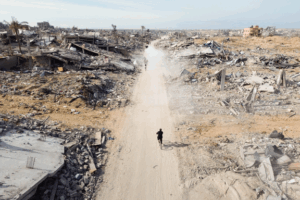After the genocide: What the future holds for Palestine

An aerial view of destroyed residential buildings in the Tel Al-Sultan neighborhood following the withdrawal of the Israeli army during a ceasefire, Rafah, southern Gaza, 19 January 2025
Muhammad Shehada writes in The New Arab on 9 October 2025:
The Palestinian cause has never enjoyed more momentum, awareness, and global solidarity than it does today. This is reflected by a wave of international recognition of Palestinian statehood, giant weekly demonstrations in Western capitals, greater isolation of Israel, and a tidal shift in public opinion. Yet the Palestinian movement has also never been in a greater state of disarray, loss, and paralysis.
Gaza is decimated, the Palestinian leadership remains intractably divided, the West Bank is under an unprecedented crackdown, and the Palestine Liberation Organisation (PLO) is obsolete.
As a fragile truce takes hold and potentially signals an end to the war, numerous questions remain unanswered, with Palestinians now facing monumental challenges and uncertainties as they try to recover from two years of unparalleled Israeli violence.
Genocidal trauma: Can Gaza become liveable again?
“We would need to invent brand new words to adequately describe the situation that Palestinians in Gaza find themselves in today,” UN officials said over a year ago. Indeed, ‘words don’t mean anything anymore’ has become the most common sentiment on the ground in Gaza after two years of mass killing. There is the sense that everything has been said, every feeling expressed, over and over again, until it becomes hollow of meaning or resonance, with silence taking over.
The two key questions Gazans commonly ask each other are technical. First, “is your home still standing?” Yet nearly every single person has had their home bombed, burned to the ground, razed, bulldozed, or blown to pieces. The second is “how many family members have you lost?” The average answer is over 100.
Nonetheless, there is a strong and undying willingness amongst many in Gaza to remain steadfast on the land and reject any plans for expulsion, migration, or displacement. Nada, a mother whose two-year-old son was born only days before the genocide, has lived through the unimaginable. Displaced several times, starved for long periods, shellshocked, and scarred by losing dozens of her family members, she still refuses to leave Gaza. Asked if she would consider travelling if given the opportunity, she told The New Arab, “Why can’t I stay in my homeland?”
Despite Israel’s destruction of over 90% of all homes in Gaza, there is strong hope that Palestinians can recover, rebuild livelihoods, and heal. “We already went as Palestinians through a similar period, the Nakba, and yet we were able to rebuild our national movement, society and economy,” Xavier Abu Eid, a former senior Palestinian diplomat, told The New Arab.
“Rebuilding Gaza is possible. There are already many plans that have been put out there,” Abu Eid added. “It begins by reaffirming Palestinian sovereignty and international assurances that Israel will not be allowed to carry out more crimes in Gaza. If this is granted, I don’t see any reason why it wouldn’t work.”
Abu Eid, however, believes there is a long road ahead for Palestinian national healing. “No people could heal without justice, which should be a precondition for negotiations. Freedom and justice should be the formula for any Palestinian approach to a political process,” he told The New Arab.
